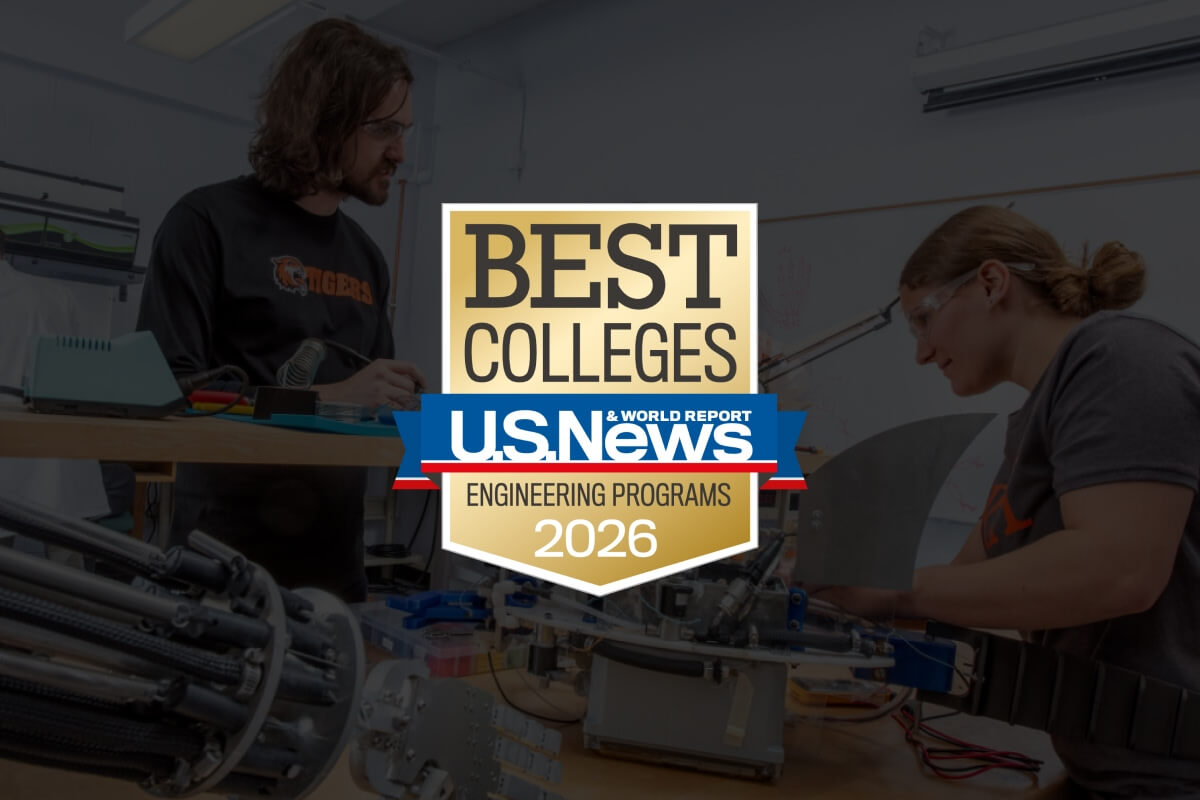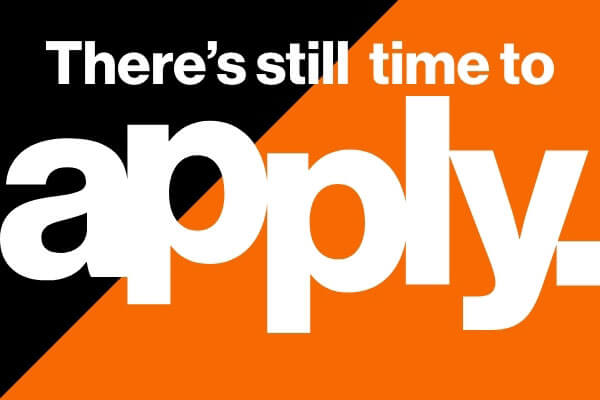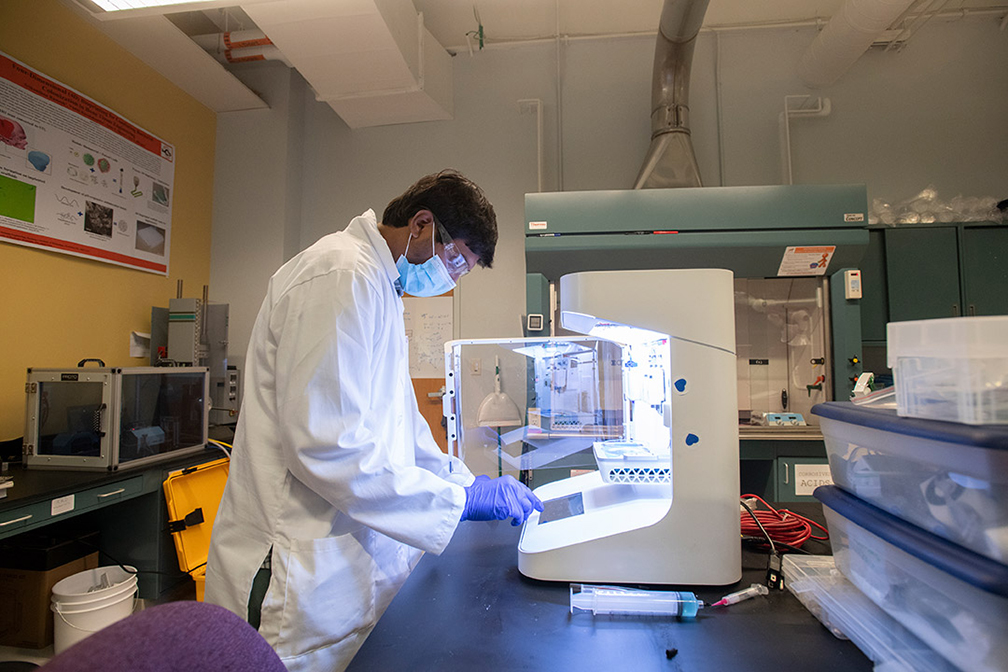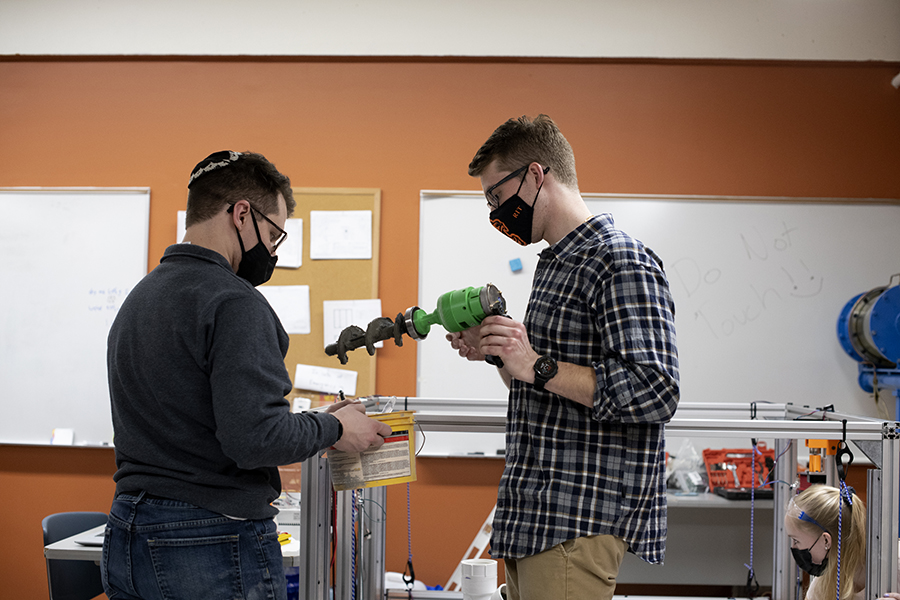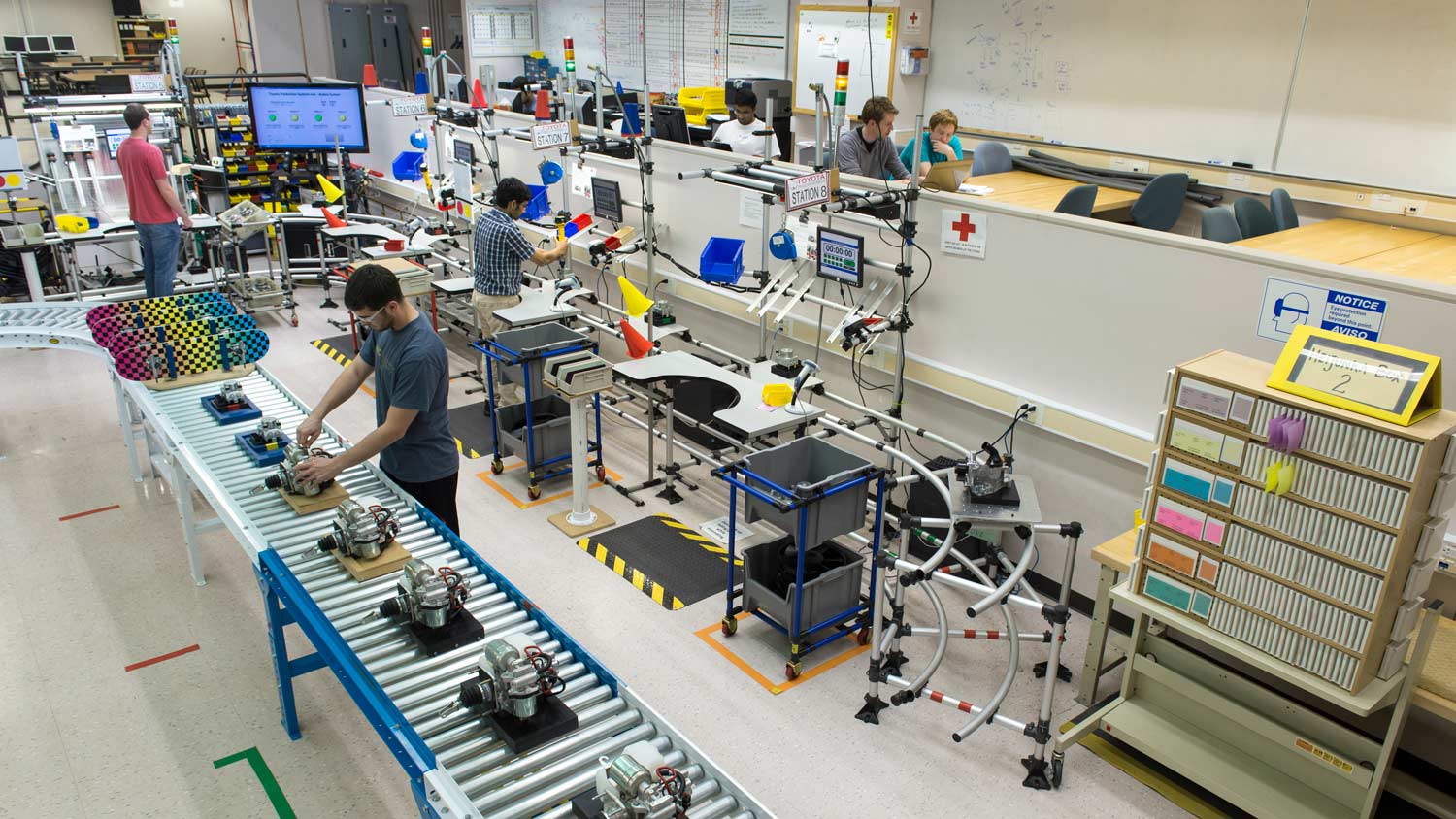Industrial Engineering Bachelor of Science Degree
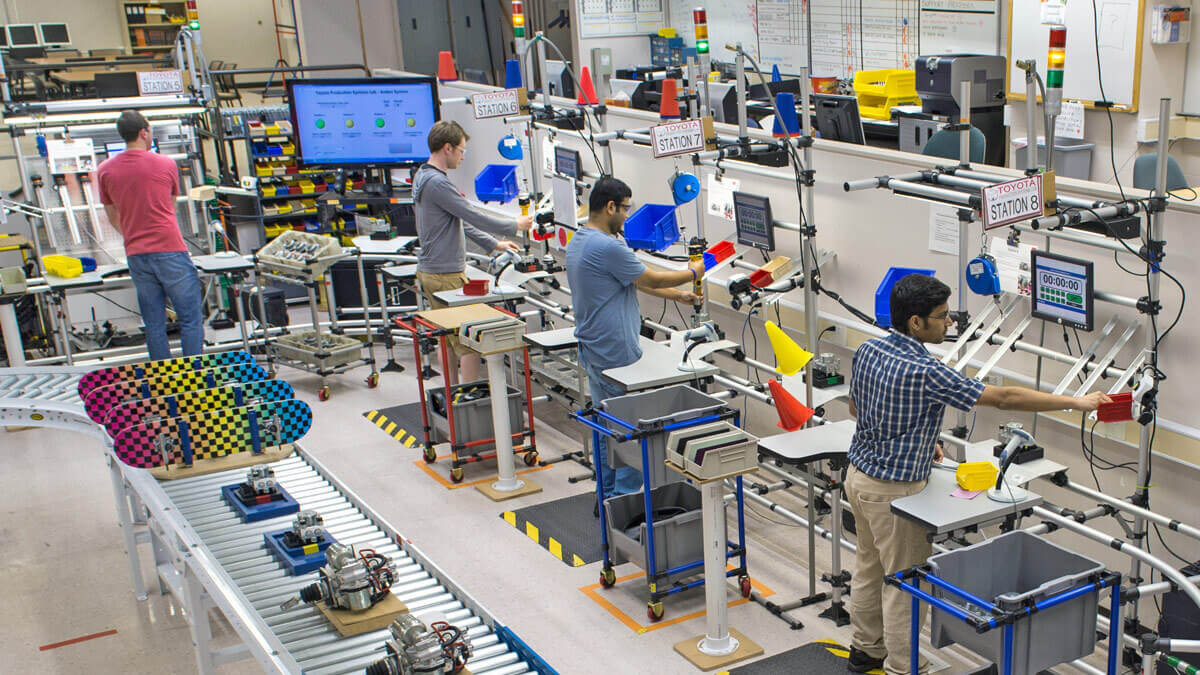
Industrial Engineering
Bachelor of Science Degree
- RIT /
- College of Engineering /
- Academics /
- Industrial Engineering BS
Overview for Industrial Engineering BS
Why Study Industrial Engineering at RIT?
Dynamic Curriculum: Gain a breadth of knowledge in many different areas of industrial engineering including advanced manufacturing, distribution/logistics, ergonomics/human factors, modeling/simulation, and sustainable design and development.
Hands-On Experience: Gain real-world career experience that sets you apart from the competition by participating in four full-time, paid blocks of co-op.
Career Readiness: Companies hiring our students for co-ops include GE Aviation, General Motors, GlobalFoundries, Intel, L3Harris, Penske Truck Leasing, Tesla, Volvo, and The Walt Disney Company, to name a few.
Accelerated Bachelor’s/Master’s Available: Earn both your bachelor’s and your master’s in less time and with a cost savings, giving you a competitive advantage in your field.
STEM-OPT Visa Eligible: The STEM Optional Practical Training (OPT) program allows full-time, on-campus international students on an F-1 student visa to stay and work in the U.S. for up to three years after graduation.
RIT’s industrial engineering bachelor’s degree provides the next generation of engineers with the industrial engineering skills to optimize, design, and improve processes. From manufacturing processes to healthcare systems to amusement parks, industrial engineers make the world run more efficiently, safely, and sustainably. Simply put, industrial engineers make the world a better place to live, work, and play.
What is Industrial Engineering?
Industrial engineering is an exciting and dynamic field that blends engineering principles with innovative problem-solving skills to improve systems and processes in a variety of industries. This field focuses on streamlining complex systems and ensuring that they work smoothly and cost-effectively, whether they are designed for manufacturing, healthcare, logistics, or service industries. As an industrial engineer, you'll address real-world challenges, and leverage data-driven insights to make impactful decisions that drive progress and efficiency. Industrial engineering is ideal for those who enjoy mathematics, science and working with people.
Industrial Engineering Curriculum
Because of the flexible nature of RIT’s industrial engineering degree, you will gain a breadth of knowledge in many different areas of industrial engineering, including advanced manufacturing, distribution/logistics, ergonomics/human factors, modeling/simulation, and sustainable design and development. Professional electives allow students to dive deeper into specific areas of interest.
The curriculum for RIT’s BS in industrial engineering covers the principal concepts of engineering economics and project management, facilities planning, human performance, mathematical and simulation modeling, production control, applied statistics and quality, data analytics and predictive modeling, and contemporary manufacturing production processes. Courses in industrial engineering focus on the application of contemporary tools and techniques in solving engineering problems.
Learn more about Student Learning Outcomes and Program Educational Objectives for the bachelors in industrial engineering.
Industrial Engineering Careers
In order to use their skills in optimizing processes and systems, industrial engineers often pursue careers in industrial engineering across manufacturing, healthcare and service industries. Upon graduation, our students have landed industrial engineering jobs at a wide array of companies including Boeing, IBM, Toyota, Xerox, Intel, General Electric, Hershey, Walt Disney World, Tesla, Ortho-McNeil Pharmaceutical, Lockheed Martin, and Wegmans.
In the manufacturing industry, industrial engineers are vital to keeping products affordable, environmentally friendly, and safe for consumers. Imagine tackling the following projects for a manufacturer of your favorite product:
- Play the role of detective to investigate sources of defects. Once the issue is discovered, you’ll error-proof the process to improve quality.
- Improve the health, safety, and morale of employees by designing and redesigning work and workstations to improve safety.
- Solve problems before they start by working with design engineers to ensure products are made efficiently with manufacturing, maintenance and recycling in mind.
- Reduce customer wait times by developing efficient supply chains. You’ll make sure the right part is available in the right location at the right time so companies can respond to customer demands quickly.
In healthcare, industrial engineers play a supporting role in ensuring healthcare is delivered more effectively and safely. As an industrial engineer, you will support medical practitioners so they can focus on providing quality healthcare. Imagine yourself in a healthcare-focused career where you might:
- Save lives by making emergency departments run more efficiently.
- Ensure critical supplies are properly stocked while balancing the need to keep inventory low.
- Help improve the morale of physicians, nurses, and residents by creating work schedules that provide adequate coverage and adequate rest.
- Improve the quality of patient care by using data to predict potential complications, allowing medical staff to provide extra care that could prevent adverse health outcomes.
- Simulate the effects of organ donation policies and suggest changes to ensure equitable access to life-saving transplants while limiting wasted organs.
Industrial engineers are champions of providing excellent customer service by working behind the scenes in industries from airlines to logistics companies to theme parks. Imagine yourself as an industrial engineer in a service industry where you might:
- Keep airline flights on time by creating and monitoring aircraft maintenance schedules.
- Maintain high levels of customer service at amusement parks by using data analytics to predict wait times at popular rides. Using your wait time predictions, determine optimal staffing and ride vehicle levels to prevent excessive waiting for guests.
- Create greener power systems by accurately forecasting energy demand so that utility companies can more efficiently operate their fleet of power plants.
- Create systems to optimally distribute donated food to a network of food pantries.
- Optimize bus routes in order to transport children to school with less emissions.
Engineering vs. Engineering Technology
Two dynamic areas of study, both with outstanding outcomes rates. Which do you choose?
What’s the difference between engineering and engineering technology? It’s a question we’re asked all the time. While there are subtle differences in the course work between the two, choosing a major in engineering vs. engineering technology is more about identifying what you like to do and how you like to do it.
Furthering Your Education in Industrial Engineering
Combined Accelerated Bachelor’s/Master’s Degrees
Today’s careers require advanced degrees grounded in real-world experience. RIT’s Combined Accelerated Bachelor’s/Master’s Degrees enable you to earn both a bachelor’s and a master’s degree in as little as five years of study, all while gaining the valuable hands-on experience that comes from co-ops, internships, research, study abroad, and more.
- Industrial Engineering BS/Engineering Management MS: In the combined accelerated dual degree pathway, you'll earn your BS in industrial engineering and youe master's in engineering management. You'll develop the skills to design and oversee the operational and manufacturing processes needed to efficiently and effectively produce and deliver goods and services. You'll also blend engineering problem-solving skills with business acumen to successfully manage and coordinate the implementation of intricate engineering and technology projects.
- Industrial Engineering BS/Industrial and Systems Engineering MS: In the combined accelerated dual degree pathway, you'll earn your BS in industrial engineering and your MS in industrial and systems engineering. You'll acquire the skills to optimize, design, manage, and innovate the operational, manufacturing, and decision-making processes necessary to produce and distribute goods and services effectively and efficiently. You'll also gain a comprehensive understanding of modern solutions to challenges in services, manufacturing, product development, and systems design. The course work places a strong emphasis on data-driven decision-making solutions, combining engineering, business insights, mathematics, data analytics, and systems perspective to design solutions for complex problems.
- Industrial Engineering BS/Science, Technology, and Public Policy MS: The dual degree pathway in industrial engineering BS/science, technology and public policy MS allows you to build a foundation in industrial engineering and develop expertise in policy analysis and management. Its cross-disciplinary approach fosters collaborative problem solving, critical and analytical thinking, and communication, equipping you to drive progress in policy areas such as technology and infrastructural, workplace safety and fair labor practices, supply chain and trade regulations, environmental sustainability, health care, and more.
- Industrial Engineering BS/Sustainable Systems MS: By pursuing the combined accelerated dual degree pathway, where you will earn a BS in industrial engineering and an MS sustainable systems, you will continue to study the big picture, exploring the environmental, political, social, technological, and business considerations that will help you understand and solve complex sustainability issues. Adding the MS degree to your studies will prepare you for advanced investigation of sustainability and related fields, and improve your employment prospects.
- +1 MBA: Students who enroll in a qualifying undergraduate degree have the opportunity to add an MBA to their bachelor’s degree after their first year of study, depending on their program. Learn how the +1 MBA can accelerate your learning and position you for success.
-
#57 Best Engineering Undergraduate Programs, 2026
RIT’s engineering majors are ranked among the Best Undergraduate Engineering Programs in the nation.
-
Join us for Fall 2026
There's still time to apply. For some programs, applications will be reviewed on a rolling, space-available basis.
-
Join Us for Accepted Student Open House
Visit campus on March 28 or April 11 to meet faculty, tour campus, and ask your questions.
Careers and Cooperative Education
Typical Job Titles
| Industrial Engineer | Sustainability Engineer | Human Factors Engineer |
| Logistics Planner | Operations Manager | Manufacturing Engineer |
| Quality Engineer | Project Manager | Systems Manager |
Industries
-
Aerospace
-
Automotive
-
Electronic and Computer Hardware
-
Manufacturing
-
Medical Devices
-
Transportation and Logistics
-
Utilities and Renewable Energy
Cooperative Education
What’s different about an RIT education? It’s the career experience you gain by completing cooperative education and internships with top companies in every single industry. You’ll earn more than a degree. You’ll gain real-world career experience that sets you apart. It’s exposure–early and often–to a variety of professional work environments, career paths, and industries.
Co-ops and internships take your knowledge and turn it into know-how. Your engineering co-ops will provide hands-on experience that enables you to apply your engineering knowledge in professional settings while you make valuable connections between classwork and real-world applications.
Students in the industrial engineering degree are required to complete four blocks (48 weeks) of cooperative education experience.
Featured Work and Profiles
-
-
-
Jason Smith ’00
Executive Director, Downtown Disney & Arrivals Experience, Disneyland Resort
Read More about Jason Smith ’00 -
-
-
Student Leverages Vast Experience at RIT to Secure a Role at L3Harris
After several years of experiential learning and participation in various RIT communities, Laura Discavage will begin work at L3Harris.
Read More about Student Leverages Vast Experience at RIT to Secure a Role at L3Harris
Curriculum for 2025-2026 for Industrial Engineering BS
Current Students: See Curriculum Requirements
Admissions and Financial Aid
This program is STEM designated when studying on campus and full time.
First-Year Admission
First-year applicants are expected to demonstrate a strong academic background that includes:
- 4 years of English
- 3 years of social studies and/or history
- 4 years of math is required and must include algebra, geometry, algebra 2/trigonometry, and pre-calculus. Calculus is preferred.
- 2-3 years of science. Chemistry and physics are required.
Transfer Admission
Transfer applicants should meet these minimum degree-specific requirements:
- A minimum of pre-calculus is required. Calculus is preferred.
- Chemistry and physics is required.
Financial Aid and Scholarships
100% of all incoming first-year and transfer students receive aid.
RIT’s personalized and comprehensive financial aid program includes scholarships, grants, loans, and campus employment programs. When all these are put to work, your actual cost may be much lower than the published estimated cost of attendance.
Learn more about financial aid and scholarships
Accreditation
FAQs
Industrial engineers work in almost every sector. RIT graduates land roles in aerospace (Boeing), entertainment (Walt Disney World), automotive (Tesla), healthcare, logistics, and semiconductor manufacturing (GlobalFoundries).
Yes, students must complete approximately one year (48 weeks) of cooperative education. This typically involves four full-time co-op blocks, allowing you to gain extensive paid work experience before graduation.
Yes, the industrial engineering BS is a STEM Optional Practical Training (OPT) program which allows full-time, on-campus international students on an F-1 student visa to stay and work in the U.S. for up to three years after graduation.
Yes, RIT offers Accelerated Bachelor's/Master's degrees. You can combine your industrial engineering BS with an MS in engineering management; sustainable systems; science, technology, and public policy; or industrial and systems engineering in as little as five years.
Research
The faculty and students in the Kate Gleason College of Engineering are engaging in numerous areas of research, which takes place across all of our engineering disciplines and often involves other colleges at RIT, local health care institutions, and major industry partners. Explore the college's key research initiatives to learn more about our research in:
Related News
-
February 5, 2026

Co-op course helps students break into competitive industries
The Independent Professional Development course was developed last year to reflect fluctuations in the current job market and to support students who, despite their best efforts, have not yet secured co-ops.
-
December 19, 2025
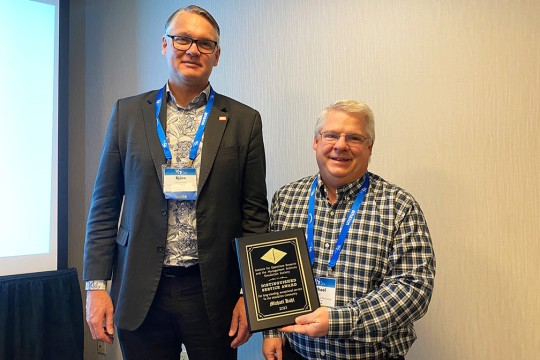
RIT engineering professor is recognized for service to the simulation community
Michael Kuhl was recognized for his distinguished work over his 25+ year career including service as I-Sim president; WSC Board of Directors; WSC program chair, proceedings editor and mobile app chair, among others.
-
November 24, 2025
BOCES students get hands-on experience at RIT labs
High school students from the New Visions Engineering program at Greater Southern Tier BOCES visited RIT for an immersive, hands-on experience in cutting-edge engineering labs.
Contact
- Katie McConky
- Department Head
- Dean’s Office
- Kate Gleason College of Engineering
- 585‑475‑6062
- katie.mcconky@rit.edu
Department of Industrial and Systems Engineering



